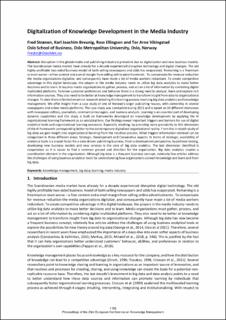| dc.contributor.author | Strønen, Fred H. | |
| dc.contributor.author | Breunig, Karl Joachim | |
| dc.contributor.author | Ellingsen, Ross | |
| dc.contributor.author | Vikingstad, Tor-Arne | |
| dc.date.accessioned | 2023-02-23T13:07:11Z | |
| dc.date.available | 2023-02-23T13:07:11Z | |
| dc.date.created | 2022-09-05T16:05:13Z | |
| dc.date.issued | 2022 | |
| dc.identifier.citation | Proceedings of the European Conference on Knowledge Management. 2022, 23 (2), 1158-1164. | en_US |
| dc.identifier.issn | 2048-8971 | |
| dc.identifier.issn | 2048-8963 | |
| dc.identifier.uri | https://hdl.handle.net/11250/3053633 | |
| dc.description.abstract | Disruption in the global media and publishing industry is prevalent due to digitalization and new business models. The Scandinavian media market have already for a decade experienced disruptive technology and digital changes. The old highly profitable two-sided business model of both selling newspapers and adds has evaporated. Remaining is a freemium or even worse – a free content and a small margin from selling online advertisements. To compensate for revenue reduction the media organizations digitalize, and consequently have made a lot of media workers redundant. To create competitive advantage in this digital landscape, the players in the media industry needs to utilize big data analytics to make better decisions and to learn. It requires media organizations to gather, process, and act on a lot of information by combining digital multisided platforms. To know customer preferences and behavior there is a strong need to analyze, learn and explore rich information sources. They also need to be better at knowledge management to transform insight from data to organizational changes. To date there is limited empirical research detailing this learning process involving big data analytics and knowledge management. We offer insight from a case study of one of Norway’s larger publishing houses, with ownership in several newspapers and online media platforms. The case study was conducted during 2021 and is based on 10 different interviews with newspaper editors, journalists, commercial managers, and business analysts. Learning is an essential part of developing dynamic capabilities and this study is built on frameworks developed on knowledge development by applying the 4I organizational learning framework as an analytical lens. Our findings reveal important triggers and barriers for use of digital analytical tools and organizational learning processes. Especially intuiting, by providing more granularity to this dimensionof the 4I framework corresponding better to the contemporary digitalized organizational reality. From this in-depth study of big data we gain insight into organizational learning from the intuition process. What triggers information retrieval can be categorized in three different areas: Strategic, Development and Cooperative aspects. In terms of strategic, availability of analytical tools is a crucial factor for a data-driven publishing business. From a development perspective, hypothesis-testing, developing new business models and new services is the core of big data analytics. The last dimension identified is cooperation as it is easier to find a common ground and direction for the organization. Big data analytics creates a coordination element in the organization. Although big data is a frequent business concept, relatively few articles address the challenges of using business analytical tools for understanding how organizations convert knowledge and learn and from big data. | en_US |
| dc.language.iso | eng | en_US |
| dc.publisher | Academic Conferences International Limited | en_US |
| dc.relation.ispartofseries | Proceedings of the European Conference on Knowledge Management;Vol. 23 No. 2 (2022): Proceedings of the 23rd European Conference on Knowledge Management | |
| dc.rights | Attribution-NonCommercial-NoDerivatives 4.0 Internasjonal | * |
| dc.rights.uri | http://creativecommons.org/licenses/by-nc-nd/4.0/deed.no | * |
| dc.title | Digitalization of Knowledge Development in the Media Industry | en_US |
| dc.type | Peer reviewed | en_US |
| dc.type | Journal article | en_US |
| dc.description.version | publishedVersion | en_US |
| dc.rights.holder | (c) 2022 European Conference on Knowledge Management | en_US |
| cristin.ispublished | true | |
| cristin.fulltext | original | |
| cristin.qualitycode | 1 | |
| dc.identifier.doi | https://doi.org/10.34190/eckm.23.2.817 | |
| dc.identifier.cristin | 2048992 | |
| dc.source.journal | Proceedings of the European Conference on Knowledge Management | en_US |
| dc.source.volume | 23 | en_US |
| dc.source.issue | 2 | en_US |
| dc.source.pagenumber | 1158-1164 | en_US |

